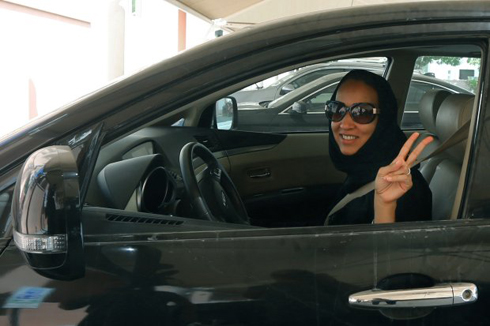On June 8, Saudi women’s rights activist Manal al Sharif gave an interview with NPR and the next day she wrote an op-ed for the New York Times. In both pieces, she discusses how women cannot drive in the kingdom, the guardianship system that underpins such restrictions, and her activism challenging the societal norm. She noted that the harassment in response to her activism was so severe that she was forced to leave her job and the country in 2011, leaving behind her six-year-old son.
Manal’s account reverberates because of broad restrictions on women throughout Saudi society due to the system of male guardianship. Research shows that when Saudi women do not drive, it severely limits their independence. Lack of public transportation forces women to hire foreign drivers. Women therefore must submit control of their lives to strangers who often sexually harass or blackmail them.
Al Sharif has been one of the leaders of the women driving movement. In 2011, after posting a video of herself driving on YouTube, officials detained al Sharif for nine days. While detained, she witnessed authorities subjecting women to vaginal searches, and they made her sleep in a cockroach infested cell. These incidents of abuse are rooted in the Saudi guardianship system that allows men to control women’s lives.
The Saudi government targets many women who challenge the guardianship system, for example Saudi authorities have targeted activist Samar Badawi, who in January 2016 was detained briefly with her two-year-old daughter for opposing restrictions to women’s healthcare and ability to travel. Then on 13 February 2017, authorities again harassed her when they called her in for questioning. This is not the first time she has been harassed and faced the ire of Saudi authorities before, as in 2010, a judge jailed her for seven months on the charge of “parental disobedience” after she fled her home to escape domestic abuse and to have her father’s role as guardian annulled. Then, on 3 December 2015, airport officials in Jeddah prevented her from traveling abroad to advocate on behalf of her husband, human rights lawyer Waleed Abu al-Khair.
Maryam al-Otaibi, a feminist who had been active in a campaign called #IAmMyOwnGuardian which sought the repeal of the guardianship system, fled her abusive family in April 2017 to live independently. Under the guardianship system, her father filed a disobedience complaint. On 19 April 2017, authorities detained her and she was later imprisoned.
Loujain al-Hathloul and Maysaa al-Amoudi are two other prominent women’s rights activists who participated in the women driving campaign. Al-Hathloul, who drove from UAE to Saudi in 2014, and al-Amoudi, who came to support her, were detained for 73 days with their cases being moved to terror courts before they were eventually released. On 4 June 2017, Saudi officials again arbitrarily detained al-Hathloul, before releasing her on 5 June.
The Saudi government has not undertaken any serious efforts to remove the guardianship system which so clearly marginalizes women, nor has it worked to repeal the ban on women driving. Rather, because the ban and the guardianship system remains, when women, such as Manal al Sharif, Maryam al-Otaibi, and Loujain al-Hathloul, challenge this system, they face intense harassment.
The international community must act to hold Saudi Arabia accountable for its discrimination against women. But, Saudi Arabia should not wait for the international community. It must immediately first drop all of its reservations to the Committee on the Elimination of All Discrimination Against Women (CEDAW). Saudi Arabia must also stop its persecution of women human rights defenders, such as Samar Badawi, Maryam al-Otaibi, and Loujain al-Hathloul, and to repeal the guardianship system, which has had such a negative impact on women’s rights.
Alex DiBell is an advocacy intern at ADHRB





